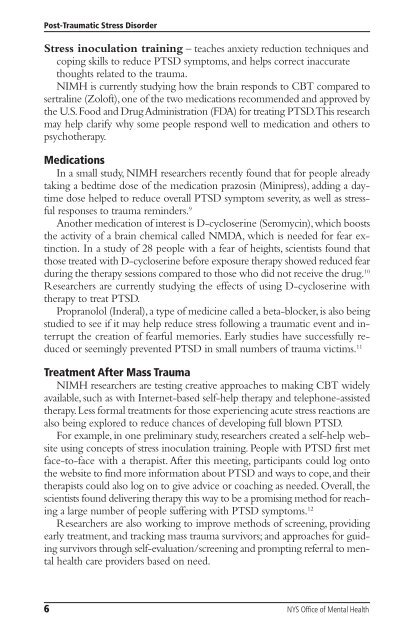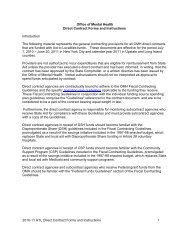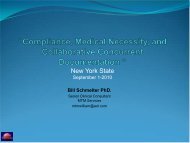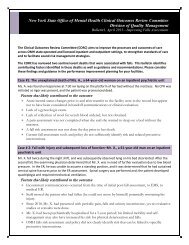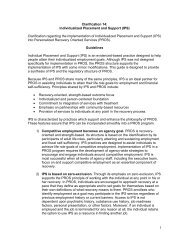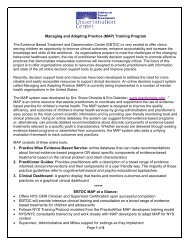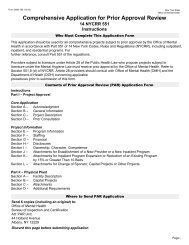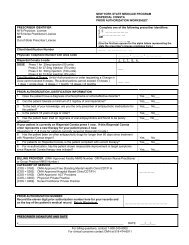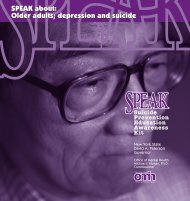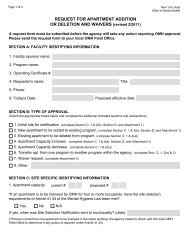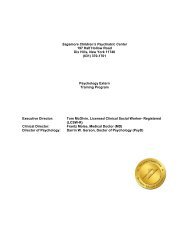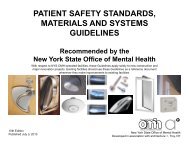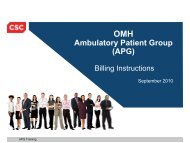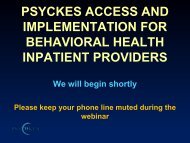Post-Traumatic Stress Disorder - Office of Mental Health - New York ...
Post-Traumatic Stress Disorder - Office of Mental Health - New York ...
Post-Traumatic Stress Disorder - Office of Mental Health - New York ...
Create successful ePaper yourself
Turn your PDF publications into a flip-book with our unique Google optimized e-Paper software.
<strong>Post</strong>-<strong>Traumatic</strong> <strong>Stress</strong> <strong>Disorder</strong><br />
<strong>Stress</strong> inoculation training – teaches anxiety reduction techniques and<br />
coping skills to reduce PTSD symptoms, and helps correct inaccurate<br />
thoughts related to the trauma.<br />
NIMH is currently studying how the brain responds to CBT compared to<br />
sertraline (Zol<strong>of</strong>t), one <strong>of</strong> the two medications recommended and approved by<br />
the U.S. Food and Drug Administration (FDA) for treating PTSD.This research<br />
may help clarify why some people respond well to medication and others to<br />
psychotherapy.<br />
Medications<br />
In a small study, NIMH researchers recently found that for people already<br />
taking a bedtime dose <strong>of</strong> the medication prazosin (Minipress), adding a daytime<br />
dose helped to reduce overall PTSD symptom severity, as well as stressful<br />
responses to trauma reminders. 9<br />
Another medication <strong>of</strong> interest is D-cycloserine (Seromycin), which boosts<br />
the activity <strong>of</strong> a brain chemical called NMDA, which is needed for fear extinction.<br />
In a study <strong>of</strong> 28 people with a fear <strong>of</strong> heights, scientists found that<br />
those treated with D-cycloserine before exposure therapy showed reduced fear<br />
during the therapy sessions compared to those who did not receive the drug. 10<br />
Researchers are currently studying the effects <strong>of</strong> using D-cycloserine with<br />
therapy to treat PTSD.<br />
Propranolol (Inderal), a type <strong>of</strong> medicine called a beta-blocker, is also being<br />
studied to see if it may help reduce stress following a traumatic event and interrupt<br />
the creation <strong>of</strong> fearful memories. Early studies have successfully reduced<br />
or seemingly prevented PTSD in small numbers <strong>of</strong> trauma victims. 11<br />
Treatment After Mass Trauma<br />
NIMH researchers are testing creative approaches to making CBT widely<br />
available, such as with Internet-based self-help therapy and telephone-assisted<br />
therapy. Less formal treatments for those experiencing acute stress reactions are<br />
also being explored to reduce chances <strong>of</strong> developing full blown PTSD.<br />
For example, in one preliminary study, researchers created a self-help website<br />
using concepts <strong>of</strong> stress inoculation training. People with PTSD first met<br />
face-to-face with a therapist. After this meeting, participants could log onto<br />
the website to find more information about PTSD and ways to cope, and their<br />
therapists could also log on to give advice or coaching as needed. Overall, the<br />
scientists found delivering therapy this way to be a promising method for reaching<br />
a large number <strong>of</strong> people suffering with PTSD symptoms. 12<br />
Researchers are also working to improve methods <strong>of</strong> screening, providing<br />
early treatment, and tracking mass trauma survivors; and approaches for guiding<br />
survivors through self-evaluation/screening and prompting referral to mental<br />
health care providers based on need.<br />
6<br />
NYS <strong>Office</strong> <strong>of</strong> <strong>Mental</strong> <strong>Health</strong>


